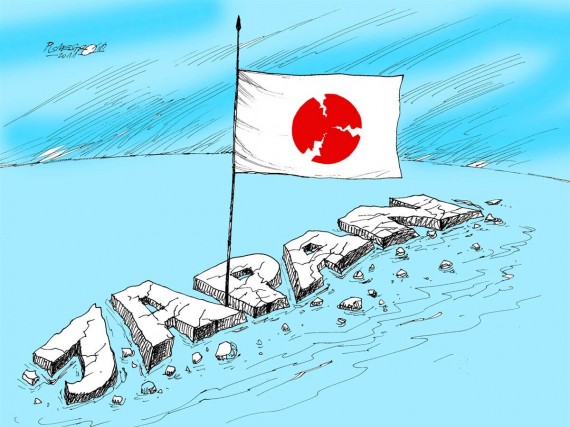John Hudson writes: Japanese Prime Minister Shinzo Abe made his most high-profile pitch yet for a trans-Pacific trade pact that has divided U.S. lawmakers and turned liberal Democrats against the White House over concerns about job losses and wage stagnation.
Abe said the Trans-Pacific Partnership, a trade proposal that would lower tariffs and harmonize regulations across 12 Pacific Rim countries, would strengthen the Japanese and American economies while bringing competing nations in line with an array of labor and environmental standards — a claim many Democrats view with skepticism.
“The U.S. and Japan must take the lead,” said Abe, the first Japanese leader to address both houses of Congress since World War II. “We must take the lead to build a market that is fair, dynamic, sustainable, and is also free from the arbitrary intentions of any nation.”
Abe painted a picture of Japan as the rule-abiding, democratic partner for the U.S. in forging standards for trade in Asia. Abe’s description casts Japan as the Asian country with the same economic values as the U.S., as opposed to China, though Abe mentioned Asia’s biggest economy only in passing. Advocates of the trade deal argue that the U.S. and Japan need to write the rules for business in Asia, lest Beijing do it for them.
Both Abe and President Barack Obama have touted their progress on the Trans-Pacific Partnership (TPP) during the Japanese leader’s visit to Washington. But no breakthroughs have been announced on the significant sticking points that still exist in the negotiations, namely agriculture and automobiles.
The trade agreement, along with another European trade pact, are both part of the Obama administration’s ambitious agenda to lower barriers for U.S. companies abroad and increase exports.
TPP still faces stiff opposition both in Japan and the U.S. Many Americans associate trade pacts with job losses that happened across the country as globalization spurred outsourcing by many U.S. companies in the 1980s and 1990s.
In addition to convincing the public in America and Japan, Obama and Abe must also persuade their local industries and legislators.
A group of Democrats accused Tokyo of manipulating the yen to boost exports — a claim that is disputed by economists but has nevertheless galvanized Democrats skeptical of global trade.
While avoiding the issue of currency manipulation entirely, Abe did seek to allay concerns that a TPP deal would spawn a race to the bottom among competing Pacific Rim countries.
The Republican 2016 presidential contenders have been broadly supportive of the trade deal, as have most Republicans, but the issue has been tricky for Democratic frontrunner Hillary Clinton, whose liberal base is more skeptical of free trade. As Secretary of State, Clinton called the TPP the “gold standard” in efforts to expand free and fair trade, but in recent days, she’s been increasingly noncommittal.
But first things first: Obama and Abe still need to solve lingering trade issues between the two countries, particularly respect to rice and automobiles.

